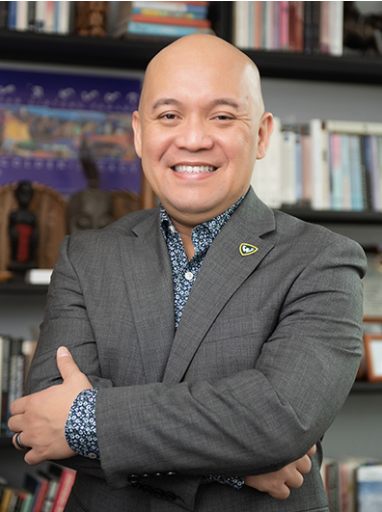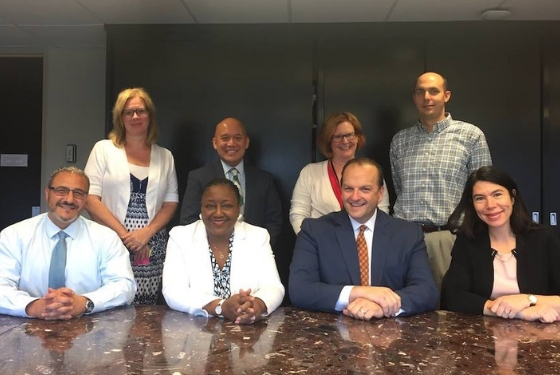New assistant dean seeks to build one of the nation's best urban teacher education programs

In the mid-90s, attacks against affirmative action, bilingual education and immigrants resulted in challenging social and educational environments for students of color in schools and colleges. As a staff member working in student affairs at the University of California, Riverside, Roland Sintos Coloma wanted to support marginalized students in their pursuit of higher education. He enrolled in an alternative teaching certification program, taking classes in the evenings and on weekends while teaching high school English full-time. The Philippine-born Coloma discovered he had much in common with his students in the Los Angeles area, many of whom were from working class, immigrant families and struggling to find their place in the world.
"I used literature and writing to help them explore their thoughts and feelings and deal with their families and communities," he said. "Even though I exposed them to literature that reflected their lives and experiences, the school curriculum was still very Eurocentric. I went against the grain by pairing canonical works with multicultural literature. I wanted them to engage with literature that had themes we could all relate to, regardless of who we are. I wanted to give them hope and help them see what life could be."
Coloma, who admits to "surviving" high school because he found it tedious and unexciting, was inspired to become a different kind of teacher.
"I didn't want students to fall through the cracks," he said. "I wanted to ensure students like me from different backgrounds had a shot at finishing high school and pursuing higher education."
Coloma believes increasing the number of teachers of color can improve outcomes for students of color and draw more young people into teaching. Teachers of color often serve as role models for all students, provide them with opportunities to explore different perspectives and help them view themselves as successful in school. Such positive experiences can encourage young people to view teaching as a potential career. He said Wayne State is in a great position to recruit more teachers of color, but cannot do it alone.
"Detroit has high proportions of African Americans, Arab Americans and Latinos, groups that are underrepresented in teaching," he said. "However, we have to be creative and compelling in how we talk about our profession, and we need to provide incentives for young people to consider this pathway. It will take a community effort - including educators working in the schools - to make sure that young people, particularly young people of color, have a positive experience in schools so they will want to be the next generation of teachers."
Detroit's history, resilience and resurgence interested Coloma, who grew up in California and completed his bachelor's and master's degrees at the University of California, Riverside. He earned his Ph.D. in cultural studies with a minor in African American studies from The Ohio State University, then served as a university faculty member and administrator in Ohio, Kentucky and Canada. Coloma asks questions around race, sexuality, and the cultural politics of education. His early research focused on the history of colonial education in the Philippines under United States rule in the early 1900s. His ongoing research explores informal forms of education for public organizing and advocacy among marginalized groups, especially racial and sexual minority communities. He is also interested in addressing teacher shortage and teachers' cultural intelligence.
"I love the idea of being able to learn more about 'other people's' histories and capture it in new forms through digital humanities, so that their stories are not just things that we read in history textbooks or journal articles but could be shown in other forms of media. Thinking about the use of history in a much more contemporary way that involves multimedia is a new direction in which I would like to take my work," he said.
"I am a historian by training, so my go-to is usually narratives of the past, and I am intrigued by what has been happening in Detroit, where the past and present are converging to create a new future," he continued. "I am learning more about Ms. Fannie Richards [1840-1922], the first African American teacher in Detroit. Her work on desegregation in the 1870s and community uplift could be a really good platform for us to think about history in terms of how we tell certain stories and how we remember the past so that questions around race and race relations can be addressed in much more meaningful ways."
Wayne State's location and urban mission also lured Coloma to the university.

"Part of the appeal of Wayne State and particularly of Detroit is the opportunity to work on issues in urban education," said Coloma, who attended and worked in schools in urban settings. "When the position of assistant dean in the Division of Teacher Education became available, I was immediately interested because this is a place that fits who I am professionally and personally. Teaching and teacher education have made me who I am as a scholar, researcher, teacher educator, and advocate. As someone who is guided by servant leadership in terms of my principles and practices, this is an opportunity for me to serve and join faculty, staff, students, and school and community partners here and, collectively, make an impact."
Coloma hopes to use his experiences and work with colleagues and partners to build one of the best urban teacher education programs in the country.
"I want our college and division to be a place where people who are interested in innovative research and effective practices in urban education would come to study, learn, and engage," he said. "We are well poised for this work. We have outstanding faculty, staff, students, alumni and partners. This is an opportunity for us to demonstrate the excellence that is already here. And the best is yet to come."
by Tracy A. Walker